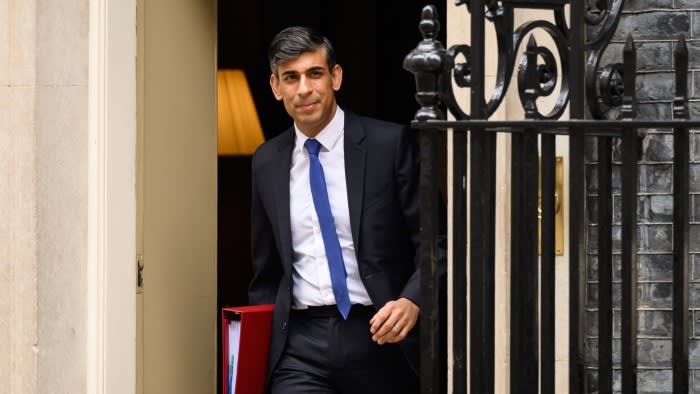
Unlock the Editor’s Digest for free
Roula Khalaf, Editor of the FT, selects her favourite stories in this weekly newsletter.
Rishi Sunak pointed to falling inflation as evidence that his economic plan was working on Wednesday as he attempted to launch an end-of-term fightback in the House of Commons.
Speaking at prime minister’s questions, Sunak said the easing in price growth to its lowest level for more than two years, coupled with rising real wages, was feeding through to voters.
After two weeks of party infighting and plotting by some Conservative MPs against his leadership, Sunak said: “We need to stick to the plan to deliver a brighter future for our country.”
Sunak, who will address Tory MPs on Wednesday ahead of the start of the Easter recess next week, added that voters had a choice between “higher taxes and back to square one with Labour or tax cuts and real change with the Conservatives”.
In exchanges at PMQs, Labour leader Sir Keir Starmer challenged Sunak to call a general election, adding: “We are ready.” In a reference to Tory plotting, Starmer said “half his cabinet” was lining up to replace the prime minister.
Starmer also tacitly acknowledged that Sunak would succeed in sending some asylum seekers to Rwanda before the election but told the House of Commons that the policy was “a gimmick to deport 300 people” to the east African country at a cost of £600mn.
Sunak was buoyed by official data showing UK inflation has fallen to its lowest level in more than two years, with consumer prices rising at an annual rate of 3.4 per cent in February.
His aides admitted that falling energy and food prices were driving the drop in inflation, but claimed that the government had contributed by holding down public spending and making supply-side reforms.
The fall from 4 per cent in January has encouraged Number 10 to believe that inflation could dip below the Bank of England’s 2 per cent target before an election, expected in the autumn.
A fall in inflation — and the possibility of pre-election cuts to the BoE’s benchmark rate, which stands at 5.25 per cent — are an essential part of Sunak’s strategy, as he attempts to make inroads into Labour’s 20-point opinion poll lead.
“If we’re to stand any chance, we have to plant the idea in voters’ minds that the economy is on the right track and that there might be a risk if they switched to Labour,” said one Tory strategist. In the Commons Sunak repeated his “working assumption” the election would be held in the second half of the year.
Although Sunak will also highlight issues such as cutting irregular migration — he hopes to get his Rwanda legislation on the statute book in the near future — the economy will dominate the Conservative campaign.
Labour officials admit privately that the economy is turning but believe it is happening too late to help Sunak, especially as many families are still coming off fixed-rate mortgages on to more expensive deals.
To counteract the Tories’ emphasis on sound economic management, shadow chancellor Rachel Reeves underlined her commitment to “stability” in her Mais lecture in the City of London on Tuesday.
Lord Nick Macpherson, former Treasury permanent secretary, has said that contrary to expectations at Westminster the economy will be recovering by the autumn and that “it could be quite a good election to win”.
Earlier Sir Ed Davey, Liberal Democrat leader, launched his party’s campaign for the May 2 local elections in England and Wales, with a focus on toppling Conservatives in southern “blue wall” seats.
“When I speak to life-long Conservative voters, they tell me that the party no longer speaks for them,” he said.
Some Tory MPs believe that Sunak could face renewed criticism about his leadership if the party fares badly in the elections, but the majority of parliamentarians think seeking to replace him would be disastrously counter-productive.
Jonathan Gullis, MP for Stoke-on-Trent North, told GB News that a leadership challenge would lead to the party being “booted out of office, not just politely, but to an extent that we will have less than 100 MPs”, compared with 348 at present.
This post was originally published on Financial Times


